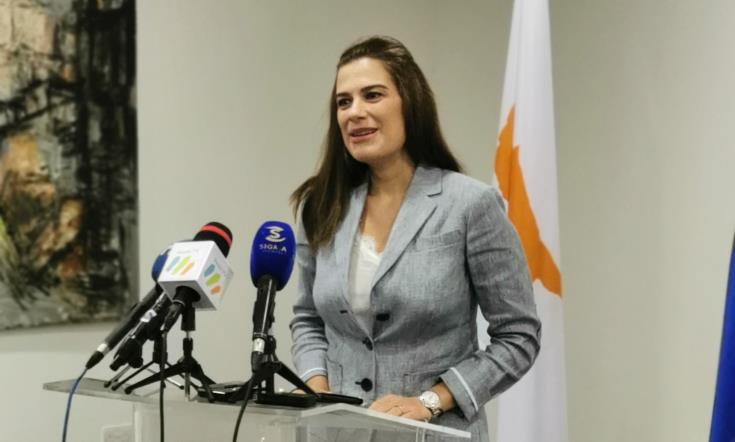Even if the EastMed pipeline project kicked off immediately, it would not provide a solution to the energy crisis that Europe is experiencing as a result of Russia’s invasion of Ukraine and the subsequent sanctions on Moscow, Energy Minister Natasa Pilides said on Wednesday.
Pilides was commenting after the cabinet meeting on growing media reports that the Cyprus-Israel-Greece pipeline project, which lost US backing and support in January this year, could be a solution for Europe in the face of current global energy developments.
But the EastMed pipeline would be a more medium-term choice for the EU as it would take around five years to be up and running, Pilides said.
“We certainly hope that the development of the Aphrodite deposits and the other deposits in Cyprus will come to prominence and be an alternative source of energy supply to the EU and in other markets,” Pilides said.
“But whether the EastMed pipeline will be built will definitely depend on the confirmed quantities available for export. At the moment the Cypriot confirmed deposits are not enough, but if there is interest from Israel, then the EastMed could definitely be an option.”
Asked about the pipeline’s viability, Pilides said the deadline for completion of the feasibility study was the end of this year. “Therefore, this is the timetable that is still in force,” she said.
The EastMed pipeline if it ever comes to fruition would be one of the longest and deepest underwater pipelines in the world and would connect Israel’s Leviathan and Cyprus’ Aphrodite fields to Europe. It would be able to carry around 10-12 billion cubic metres of natural gas per year, which is estimated would cover about 10 per cent of Europe’s supply.
Greece, Cyprus and Israel had approved an agreement for the €6 billion pipeline, which was in the planning for several years. They had aimed to reach a final investment decision this year.
But in an apparent U-turn, the US State Department announced in January it was abandoning the EastMed project, although it had been declared a ‘project of common interest’ by the European Commission. Washington, under the Biden administration, let its concerns be known in a note sent to Greece.
Concerns about the financial viability of the project had been heard before, but, officially at least, Greece, Israel and Cyprus have continued to support the project.
However, Ankara has repeatedly said that any plans in the eastern Mediterranean that exclude it were bound to fail and that it would defend its rights in the region. It has opposed the EastMed project, saying the plan could not work without Turkey’s approval.
Turkish President Tayyip Erdogan has recently met with the leaders of Greece and Turkey. He has said that Turkey and Israel could work together to carry Israeli natural gas to Europe, reviving an idea first discussed more than 20 years ago. He described his recent meeting with his Israeli counterpart as “turning point” in relations.
But a growing number of reports since Russia invaded Ukraine have now brought attention back to the EastMed pipeline as a solution for Europe.
In one of the most recent, The Hill reported that if the US was serious about energy security in Europe, it must help ensure that eastern Mediterranean natural gas makes it to Europe.
“Considering Russia’s war in Ukraine and its downstream effects, Biden must show flexibility and adapt his natural gas policy,” the paper said, also citing Chevron CEO Michael Wirth who spoke out in favour of the EastMed pipeline because of the current crisis.
Chevron bought out Noble Energy, which had the concession for Cyprus’ Aphrodite field, in July 2020.
Pilides, when asked on Wednesday why the Aphrodite deposits has not been exploited so far, said strictly speaking it was not an issue of being late, but the company was working in accordance with its contract. Also, the deposits were quite limited relative to the investment that needed to be made, she said.
“That’s why Chevron, the new manager of the Aphrodite consortium, is figuring out ways to work together either with Israel and Chevron’s operations there, or as part of their activities in Egypt,” she said.
As for the remainder of Cyprus’ deposits, Pilides said confirmation drilling in the Glafcos field would be completed by the end of March
“We will be expecting some information from the consortium, which will relate more to the quality of the gas that has been identified. As for the exact quantity, they will still need some time to process the data and we hope that after a few weeks of analysis they will be able to inform us more thoroughly about the quantity,” she added.







Click here to change your cookie preferences